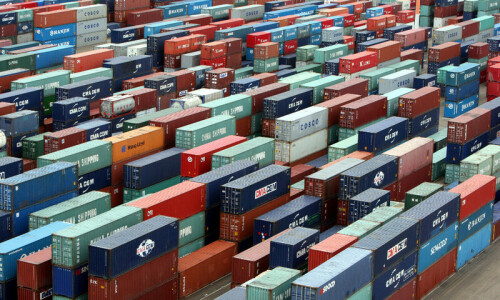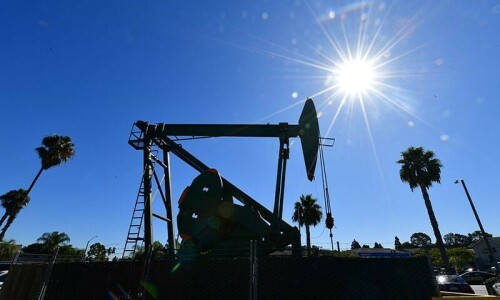• ECC approves 17pc tariff hike after IMF’s consent
• No increase for domestic consumers
• Textile exporters term the move detrimental to industry
ISLAMABAD: The Economic Coordination Committee (ECC) of the Cabinet on Saturday approved a significant increase of nearly 17 per cent in gas tariffs for captive power plants (CPPs).
Additionally, the ECC rejected a proposal from the Petroleum Division to raise gas prices for non-protected domestic consumers.
The tariff hike decision contrasts with the earlier government’s announcement to halt gas supply to the CPPs from Feb 1. The initial plan faced significant backlash from the textile and clothing sectors, which argued that the move would severely undermine the country’s export competitiveness against major global rivals.
The ECC meeting chaired by Finance Minister Muhammad Aurangzeb discussed a summary submitted by the Petroleum Division for an upward revision of the indigenous gas tariff for industry (captive power) and non-protected domestic slabs.
Petroleum Minister Musadik Masood Malik, Power Minister Sardar Awais Ahmed Khan Leghari, State Minister for Finance and Revenue Ali Parvez Malik, Ogra chairman, SECP chairman, federal secretaries, and senior officers from the relevant divisions also attended the meeting.
An official announcement said the ECC approved an upward revision in gas tariff for CPPs from Rs3,000 to Rs3,500 per mmBtu to ensure the required revenue for the gas sector during 2024-25. However, the ECC did not agree to increase the tariff for domestic consumers to protect them.
The ECC, however, instructed the Petroleum Division to take necessary measures to implement a grid transition levy on the CPPs to enhance energy sector efficiency.
The ECC’s decision is subject to the approval of the federal cabinet. The Oil and Gas Regulatory Authority (Ogra) will notify the hike in gas tariff by Feb 15, a deadline agreed with the International Monetary Fund (IMF).
Starting July 1, 2024, the government has raised the CPP gas tariff from Rs2,750 to Rs3,000 per mmBtu. No tariff hikes were announced for other categories, including CNG, power sector, industrial, commercial, or domestic consumers.
A total of 480 CPPs operate on the SNGPL network and 800 on the SSGC network, relying on combined heat and power (CHP) systems to maintain voltage stability and avoid damage to highly automated machinery. The textile sector has billions of rupees invested in gas-based power generation systems to ensure stable and reliable energy for industrial operations.
Exporters slam decision
Textile Exporters Association Patron-in-Chief of Pakistan Khurram Mukhtar has expressed serious concerns over the gas tariff hike for CPPs, terming it unprecedented and a direct blow to Pakistan’s export competitiveness. He pointed out that the new tariff exceeds the revenue requirements of both Sui companies and unfairly imposes an 8pc Unaccounted For Gas (UFG) charge on the textile sector, despite actual losses being less than 0.5pc.
“The textile sector has been repeatedly targeted with exorbitant energy costs, making our exports uncompetitive in global markets,” Mukhtar stated. He further added that there is no justification for the proposed grid transition levy, which the industry categorically rejects.
“CHPs are an integral part of production and should not be classified as Captive Power Plants. Additionally, each consumer should have one connection, simplifying operations and ensuring fairness,” he emphasized.
“Without meaningful reforms, the industry will face further challenges, jeopardizing Pakistan’s economic stability and export potential,” he warned.
Domestic consumers
In December 2024, Ogra asked the federal government to increase gas tariffs for domestic consumers. Acting on Ogra’s directions, the Petroleum Division proposed a Rs100 per mmBtu hike for non-protected domestic categories, while no changes were proposed for protected domestic categories.
Additionally, fixed charges and minimum charges for domestic consumers remained unchanged. However, the ECC did not approve the proposal, which could be because of political challenges and potential backlash from opposition parties.
It is worth mentioning that the government had previously raised gas tariffs for domestic consumers starting Jan 1, 2024.
Similarly, no gas tariff changes were proposed for other consumer categories, including CNG, general industry, power sector, cement, and fertilisers sectors, except for the increase in CPP tariffs.
Published in Dawn, January 26th, 2025














































